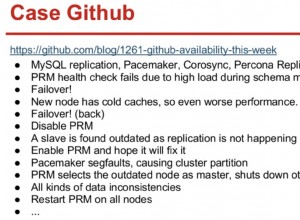L'appiattimento di un array potrebbe portare a documenti piuttosto grandi, perché per ogni elemento interno dell'array devono essere ripetuti tutti i dati del suo elemento esterno (e questo per tutti i livelli).
Quindi, se l'appiattimento non è un'opzione, ecco una soluzione alternativa mentre si attende la funzionalità avanzata nel menzionato Jira (SERVER-831 ):
- leggere il documento in una variabile
- manipola l'array
- aggiorna il documento, riscrivendo l'intero array
Dati i tuoi esempi, questo sarebbe simile a questo:
doc = db.xx.findOne( {_id:1} );
doc.properties.forEach( function(p) {
if ( p.property_id == 2 ) {
p.tags.forEach( function(t) {
if ( t.tag_id == 3 ) {
t.tag_value = 100;
}
else if ( t.tag_id == 4 ) {
newChannel = {};
newChannel.channel_id = 5;
newChannel.channel_name = "test5";
t.channels.push(newChannel);
}
})
}
});
db.xx.update({_id:1},{$set:{properties:doc.properties}});
Il risultato è:
doc = db.xx.findOne({_id:1})
{
"_id" : 1,
"properties" : [
{
"property_id" : 1,
"tags" : [
{
"tag_id" : 1,
"tag_value" : 1000,
"channels" : [
{
"channel_id" : 1,
"channel_name" : "test1"
},
{
"channel_id" : 2,
"channel_name" : "test2"
}
]
},
{
"tag_id" : 2,
"tag_value" : 2500,
"channels" : [
{
"channel_id" : 2,
"channel_name" : "test2"
},
{
"channel_id" : 3,
"channel_name" : "test3"
}
]
}
]
},
{
"property_id" : 2,
"tags" : [
{
"tag_id" : 3,
"tag_value" : 100,
"channels" : [
{
"channel_id" : 1,
"channel_name" : "test1"
},
{
"channel_id" : 3,
"channel_name" : "test3"
}
]
},
{
"tag_id" : 4,
"tag_value" : 5000,
"channels" : [
{
"channel_id" : 1,
"channel_name" : "test1"
},
{
"channel_id" : 5,
"channel_name" : "test5"
}
]
}
]
}
]
}




